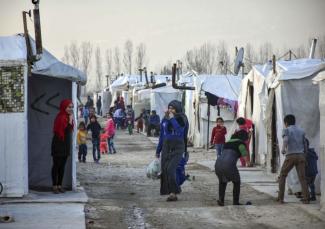Syrian refugee children
Urgent need for action

More than 5 million Syrians have fled their homeland, and half of them are children. According to UN figures, another 6 million people are on the run within Syria (also see article by Mona Naggar, p. 33). In February 2018, employees of the international aid organisation World Vision had the opportunity to interview over 1,200 Syrian refugee children aged 11 to 17 in southern Syria, Lebanon and Jordan about their current situation. The result is documented in the recently published study “Beyond survival”.
The displaced children who are still in Syria have the most immediate fear of war, the report states. However, the conflict has dramatically changed all children’s family circumstances and social environment. They tend to live in difficult conditions of poverty. They miss family members and friends who were previously part of their lives. Their future is uncertain.
A major problem for all the children surveyed was the cramped living situation. More than 70 % of children in southern Syria and Lebanon said they lived in the same room with at least three people, in Jordan even 80 % said so. Tense housing often leads to domestic violence. In both southern Syria and Lebanon, over 60 % of the children reported they were living in unsafe dwellings – for example without access to water or electricity or in damaged buildings. According to the report, more than half of all children had no access to health care. Every fifth refugee child in Lebanon and southern Syria does not get enough to eat.
Many of the children surveyed stated that they had to work in order to increase their family’s income. Three out of five children interviewed in Lebanon did not go to school at all. According to the report, the situation was somewhat better in southern Syria and Jordan, where eight and 11 % respectively did not attend school.
In southern Syria, 99 % of the surveyed children suffered educational stress factors – be it violence at school or problems with teaching materials. In Lebanon the respective share was 86 %, in Jordan 52 %. Many of the children said they could not focus on homework because of the crowded housing situation. The children did not only complain about problems with the teaching materials. Especially in the southern regions of the country they reported physical punishment and severe verbal abuse at school. World Vision points out that the teachers are under considerable pressure themselves, and that also affects the classroom situation.
The children’s stories in “Beyond Survival” describe the struggle they are exposed to. Such stress can lead to long-term mental problems such as post-traumatic stress syndrome, depression and anxiety. The stress factors must be addressed, World Vision demands. Otherwise, children will face long-term health problems such as heart disease, strokes, low resistance. Social concerns arise as well, including violence and lifelong poverty.
According to Wynn Flaten, head of Syria aid at World Vision, the goal is not only to ensure the bare survival of girls and boys, but rather to protect their childhood as such so that they can grow up to be physically and mentally healthy persons. World Vision appeals to everyone involved: the violence must end, the families must be supported and reunited. Psychosocial support programmes are urgently needed to enable children to develop the capacity for reconciliation and to build a better future for their country.
Link
World Vision, 2018: Beyond survival. Seven years of war on Syria’s children.
https://www.wvi.org/sites/default/files/Beyond%20Survival%20-%20Web.pdf










